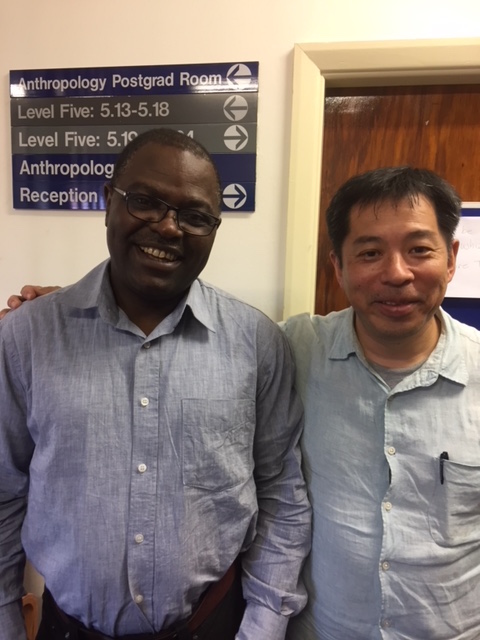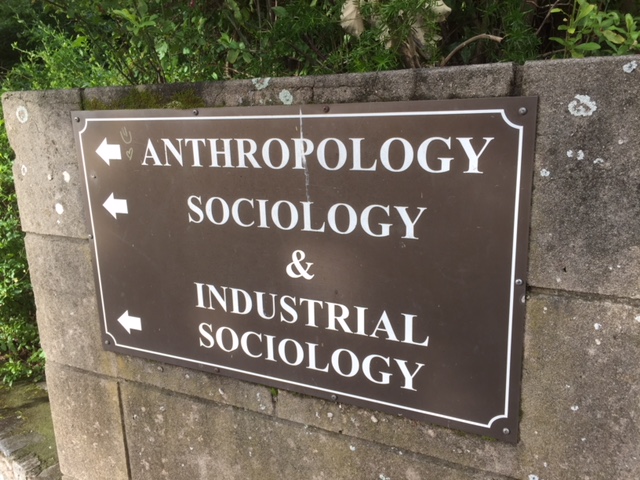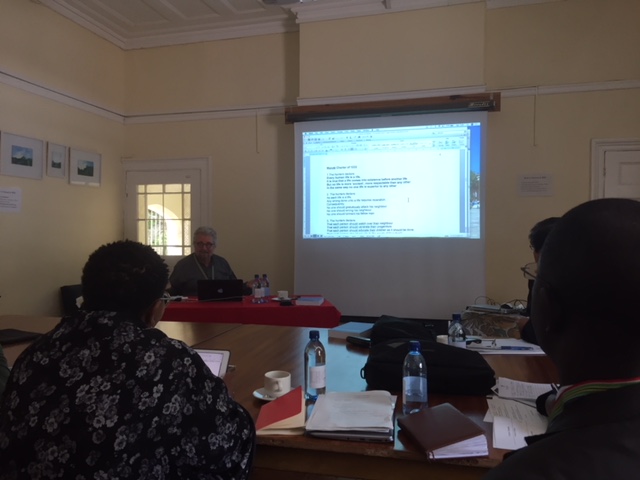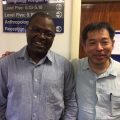
South Africa Report
―On the University of Cape Town and the Rhodes Forum―
Kyoto University
Graduate School of Asian and African Area Studies
Associate Professor
TAKADA, Akira
I primarily spent the period from November 21 to 28, 2017 visiting the University of Cape Town and Rhodes University, where I collected materials, reported research findings, and engaged in the exchange of opinions related to the planning and management of this project, “Network formation for reconstructing the paradigm of African Area Studies in a globalizing world”.
At the University of Cape Town, I visited the Centre for African Language Diversity (CALDi), our counterpart for this study, and collected data relevant to the Program for Accelerating the Circulation of Research Talent and Reconstructing the Paradigm of African Area Studies, as well as to research on African hunter-gatherer societies. I met Professor Francis B. Nyamnjoh of the Department of Social Anthropology to discuss research on Reconstructing the Paradigm of African Area Studies that accounts for globalization.

Photo 1. Prof. Francis B. Nyamnjoh (left) and the reporter (right) at the Department of Social Anthropology, University of Cape Town.
Prof. Nyamnjoh was born in Cameroon and obtained his bachelor’s and master’s degrees from the University of Yaoundé and his doctorate from the University of Leicester in the UK. Then, he worked in several universities in Cameroon and Botswana. Beginning in 2009, he has been involved in education and research related to sociology, social anthropology, and communication theory at the University of Cape Town. Dr. Nyamnjoh’s extensive research on the identity and intersubjectivity of African peoples during the post-colonial era and on civil society theory has been highly regarded, not only in continental Africa but also in the West and Japan. His work is representative of modern continental African scholarship. At our meeting, we discussed the status of young researchers dispatched from Kyoto University to the University of Cape Town, and made concrete suggestions and arrangements to develop the current program and facilitate further scholarly interaction between researchers from both universities.
Next, at Rhodes University, I attended the Rhodes Forum and presented my findings on the history of the education of African peoples. In addition, I also exchanged opinions with the participants and gathered information regarding the Program for Accelerating the Circulation of Research Talent and Reconstructing the Paradigm of African Area Studies. Rhodes University, nestled in a quiet town called Grahamstown in the province of Eastern Cape, is a prestigious university representing South Africa. During my visit, I attended the Rhodes Forum (7th African Forum) organized by Professors Michael Neocosmos, of the Faculty of Humanities at Rhodes University, and Motoji Matsuda, of the Graduate School of Letters at Kyoto University (Photos 2 and 3). The Rhodes Forum was arranged as part of a forum series held around continental Africa to promote discussion on the potential Africa holds to help overcome modern global issues. This main objective resonates greatly with the objectives of our project. I, the reporter, delivered a presentation titled “The medium of instruction in north-central Namibia in colonial times” and reported research findings on the history of systems and practices surrounding language as a medium of education for non-white South Africans, for the Owambo people in north central Namibia, and for the San people in the Ohangwena region of the same area. At the Forum, outstanding researchers, both young and experienced, from the University of Cape Town, Rhodes University, United Nations University in Kenya, Makerere University in Uganda, University of Namibia, University of Botswana, Kyoto University, Osaka University, Tsuda College, Rikkyo University, and so on, gathered to discuss topics related to each research presentation. Through these discussions, I acquired valuable information on topics such as the African education system, utilization of indigenous knowledge, historical role of missionaries, modern urban issues, issues of xenophobia, and issues related to racial minorities and native people, as well as also obtained suggestions to help guide future research.

Photo 2. Signboard indicating the buildings of the Departments of Anthropology, Sociology, and Industrial Sociology at Rhodes University.

Photo 3. Prof. Michael Neocosmos is seen delivering a presentation in front of a screen at the Rhodes Forum.
This visit to the University of Cape Town and Rhodes University contributed greatly toward the development of an inclusive academic partnership system between continental Africa and Japan, which is the goal of this program, and also toward the promotion of practical research on the sustainable development of modern society in the midst of globalization. Accordingly, we plan to promote the construction of an educational research network related to African area studies.









